However, coffee processing and exporting enterprises are still confident in the sustainable development of this industry in the future, because there is still much room in markets around the world.
Information from the United States has significantly affected Vietnam's key export products such as seafood, machinery, equipment, agricultural products, etc.
Meanwhile, Vietnam's coffee is a key export commodity, with the second largest output in the world (after Brazil) and the world's largest exporter of Robusta coffee.
In the 2023-2024 crop year, Vietnam will export 1.45 million tons of coffee, with a turnover of more than 5.4 billion USD. Export markets are over 80 countries and territories, of which more than 81,000 tons are exported to the United States (accounting for 6% of Vietnam's total coffee export turnover).
Currently, world coffee prices have started to decline on April 3, when investors are concerned that the US's reciprocal tariffs on many countries will hurt coffee consumption demand in those countries.
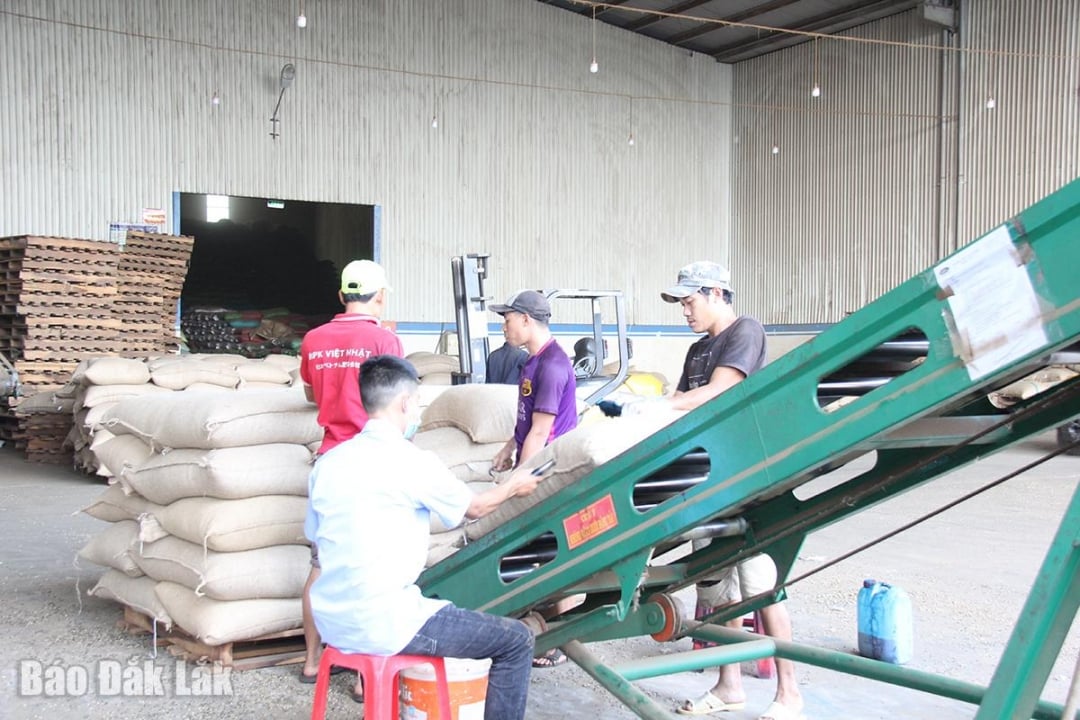 |
| Gathering export goods at a coffee enterprise in Dak Lak province. |
However, according to Chairman of Buon Ma Thuot Coffee Association Trinh Duc Minh, despite the pressure from tariffs, the United States is not a coffee producing country and basically, the Vietnamese coffee industry has diversified its market before, while the demand for Robusta coffee in the world is increasing, so there will be no need to worry too much about the market if businesses know how to adapt. Currently, Vietnamese coffee has been exported to more than 80 countries and territories and we can shift our focus to other markets, especially markets in Asian countries such as China, Japan, Korea, etc., which are consuming a lot of Vietnamese Robusta coffee. Moreover, in the context of high coffee prices, many roasters, affected by raw material costs, have increased the use of Robusta to replace Arabica, Robusta coffee products are becoming more and more popular. This means that even if they lose some market share in the United States, Vietnamese enterprises can still seek good profits from other markets.
Another positive sign for the Vietnamese coffee industry is that global coffee consumption has grown steadily over the past years, driven by population growth, the development of the middle class and changes in lifestyle. Coffee is not only a popular drink but also considered a part of global culture. On the other hand, domestic consumption is also forecast to increase at an average rate of about 6.6% per year in the period of 2025 - 2030, with domestic consumption reaching about 270,000 - 300,000 tons per year in the period of 2024 - 2025.
However, Vietnam is not the only coffee producer in the global market. Countries such as Brazil, Colombia, and Indonesia also produce large quantities of coffee and are constantly improving the quality. This puts pressure on Vietnam to maintain its competitive position, especially with Robusta, Vietnam's main coffee variety, in the context of tariffs applied in these countries being much lower than Vietnam's.
One day after the reciprocal tax took effect, on the morning of April 10, US President Donald Trump made a move to postpone the imposition of reciprocal tax by the US for 90 days on dozens of countries, including Vietnam. This is a hopeful signal, but coffee industry businesses also have certain strategies to be ready to respond to possible bad scenarios.
Since the beginning of April 2025, information about the US reciprocal tax policy has been related to almost every industry and every country. However, according to records, businesses and organizations in the coffee industry are confident in the solutions that the Vietnamese Government has implemented and is continuing to implement.
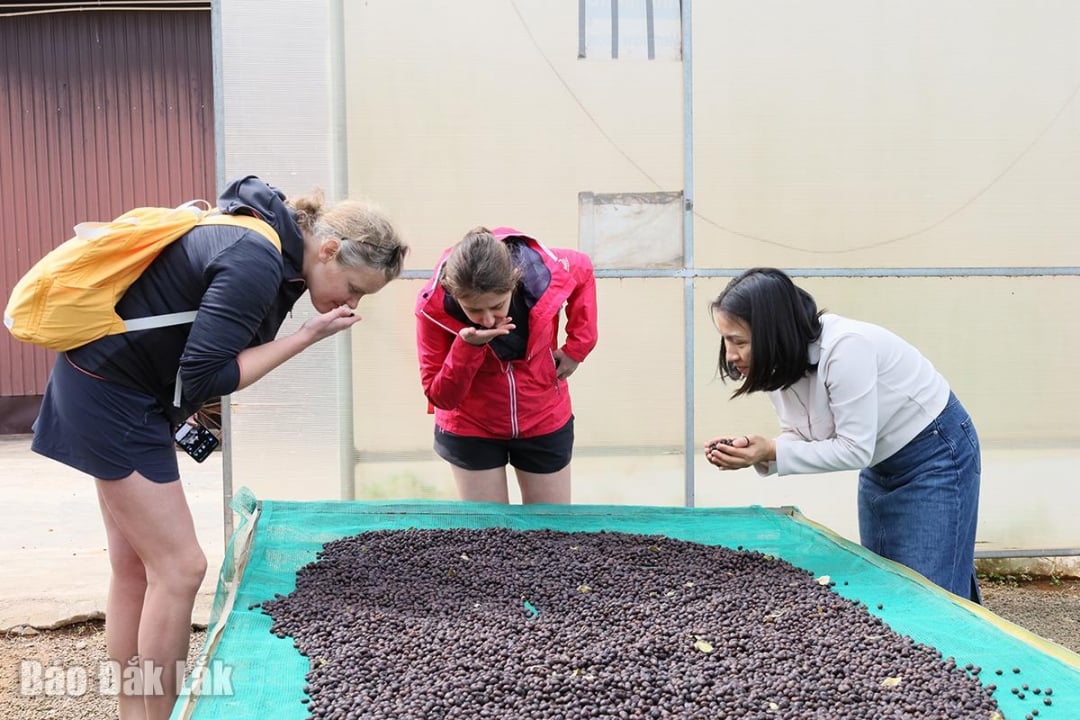 |
| Customers learn about the high quality coffee production process at Aeroco Coffee Farm. |
According to Mr. Bach Thanh Tuan, Vice President of the Vietnam Coffee and Cocoa Association (Vicofa), currently all information about the official reciprocal tax calculation is unclear, businesses as well as the entire industry are looking forward to good signals from Vietnam's negotiations. Previously, Vietnam had excellent positive responses and actions such as General Secretary To Lam talking to US President Donald Trump, the Prime Minister meeting to discuss response solutions and immediately assigning Deputy Prime Minister Ho Duc Phoc to work in the United States.
According to the Vicofa representative, this is expected to bring good cooperation prospects for the two countries. Enterprises and industries believe in the quick and strategic actions of the Government. From the perspective of industry organization, Vicofa has proposed and recommended to the superior agency and is waiting for realistic signals at the national level in the coming time.
While waiting for the negotiation results, some coffee roasting enterprises in Dak Lak also expressed concern that if the new higher tax rate is applied, it will cause US importers to switch to finding supplies from Brazil or Colombia, two countries less affected by this tax. Without a suitable strategy, the Vietnamese coffee industry will face the risk of losing the market. However, in the face of the new situation, many enterprises said they will adjust their business strategies to adapt, such as diversifying the market, promoting on-site exports, and increasing product value...
Mr. Le Dinh Tu, Director of Minudo Farm-Care LLC, shared that the company is currently increasing sales in the domestic market with quality products, combined with agricultural tourism so that consumers can directly access the products in the form of farm to cup - from farm to cup of coffee. And to survive in the future, coffee companies must diversify their markets and market segments to avoid being passive.
It can be said that the US reciprocal tax policy is not only a simple trade barrier, but also a "test" for the adaptability, transparency and sustainability of Vietnamese coffee enterprises in the global supply chain. In the context of increasingly tense world trade, product prices may increase, losing their comparative advantage with competitors subject to lower tax rates. In terms of indirect impacts, this policy can put pressure on finance, labor, and the domestic market, causing businesses to reduce revenue, profits, lose liquidity, and lose jobs. Therefore, coffee enterprises have determined the appropriate direction to guard against trade risks in the world market.
On the afternoon of April 9 (local time), within the framework of his visit to the US as Special Envoy of General Secretary To Lam to discuss bilateral economic and trade issues, Deputy Prime Minister Ho Duc Phoc met with US Trade Representative Jamieson Greer. Here, the US side agreed that the two sides would start negotiations on a reciprocal trade agreement, which would include tax agreements; continue to closely coordinate to promote a favorable business environment, proactively review and consider minimizing non-tariff barriers for each other's goods, facilitate US enterprises to increase investment and business in Vietnam, and strengthen coordination to control and prevent acts of trade fraud. |
Source: https://baodaklak.vn/kinh-te/202504/nganh-hang-ca-phe-truoc-vien-canh-thue-doi-ung-tu-hoa-ky-san-sang-thich-ung-74817b9/


![[Photo] President Luong Cuong awarded the title "Heroic City" to Hai Phong city](https://vphoto.vietnam.vn/thumb/1200x675/vietnam/resource/IMAGE/2025/5/13/d1921aa358994c0f97435a490b3d5065)

![[Photo] President Luong Cuong attends the inauguration of the international container port in Hai Phong](https://vphoto.vietnam.vn/thumb/1200x675/vietnam/resource/IMAGE/2025/5/13/9544c01a03e241fdadb6f9708e1c0b65)
![[Photo] Prime Minister Pham Minh Chinh receives Ambassador of the French Republic to Vietnam Olivier Brochet](https://vphoto.vietnam.vn/thumb/1200x675/vietnam/resource/IMAGE/2025/5/13/f5441496fa4a456abf47c8c747d2fe92)
![[Photo] Many people in Hanoi welcome Buddha's relics to Quan Su Pagoda](https://vphoto.vietnam.vn/thumb/1200x675/vietnam/resource/IMAGE/2025/5/13/3e93a7303e1d4d98b6a65e64be57e870)


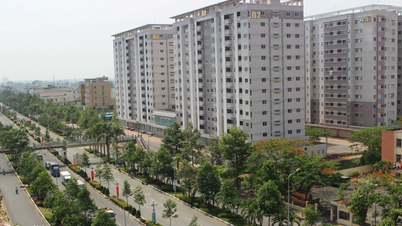


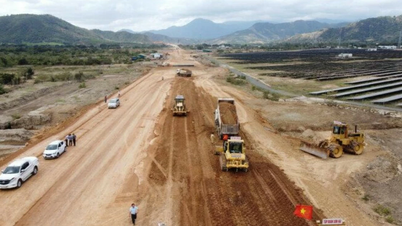
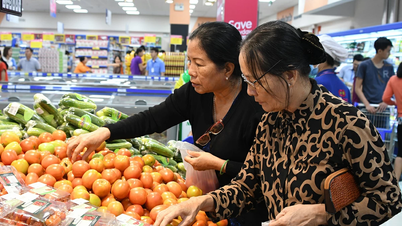




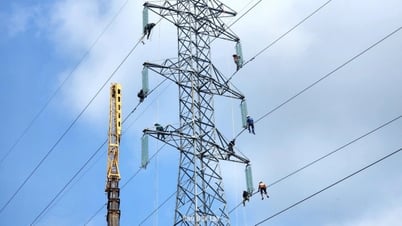























































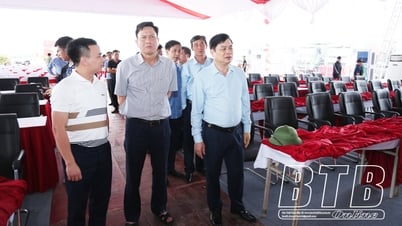

















Comment (0)